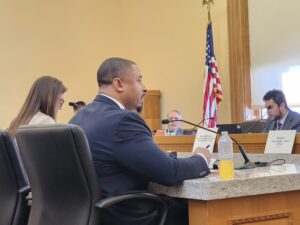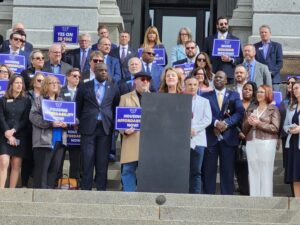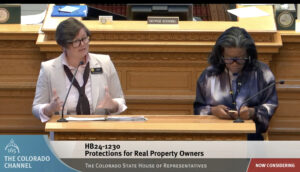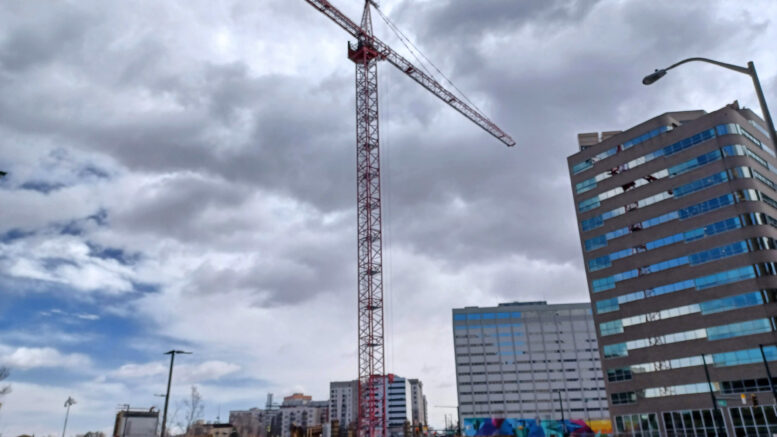The most significant effort in seven years to advance construction-defects reform ended Friday, with the House sponsor of a bipartisan bill choosing to kill it because she’d run out of time to craft a compromise that would allow it to make it through the House.
Senate Bill 106 died just three weeks after it passed the Senate on a 25-8 vote — the most bipartisan support that any major housing bill has received during a 2024 session in which housing is arguably the central issue. The broad coalition of builders, housing advocates and metro mayors supporting the effort expressed frustration that the longer the bill sat without getting a hearing in the House, the more its opponents sensed its imminent demise and pulled back on negotiations.
The bill sought one primary outcome: Bring back into the market property insurers willing to offer reasonably priced policies on condominiums, where insurance costs now make up five times the portion of hard construction costs that they do for apartment projects. Without such availability, the number of active condo builders fell from 146 in 2007 to 23 in 2023, according to a Common Sense Institute study, leaving condos to make up just 3% of new housing stock in the state.
That dearth of lower-priced entry-level options to owner-occupied housing has left an entire generation unable to buy property as Colorado faces a shortage of some 120,000 housing units and costs continue to escalate, bill backers bemoaned. And both the bill’s sponsors and the Homeownership Opportunity Alliance organized to support SB 106 said the way to fix that was to reduce the frequency and intensity of construction-defects lawsuits that have plagued the sector since a change in state tort law in 2007.
What the construction-defects reform bill would have done
SB 106 sought to raise from a simple majority to 60% the threshold vote of unit owners for a homeowners’ association to file a defects lawsuit, and it sought to prevent lawsuits filed purely for technical code violations like the spacing of nails. It also doubled down on a 2017 law that sought to require condo owners to know the drawbacks to filing lawsuits — such as an inability to sell a unit involved in legal action — before they filed them.

Colorado state Sen. James Coleman answers questions in March about SB 106.
Seeking consensus, cosponsoring Democratic Sens. Rachel Zenzinger of Arvada and James Coleman of Denver made significant changes, including removal of a clause to offer builders a right to remedy purported defects by hiring a third party to fix them. They also redefined the circumstances under which SB 106 would permit defects lawsuits, settling on language suggested trial-attorney opponents that there must be a “verified danger” of injury, loss of property or inability for a home to function in order for a claim to proceed.
SB 106 cleared the Senate on April 11 a 25-8 vote, earning support from every Republican in the chamber as well as a majority of Democrats. But House Speaker Julie McCluskie did not introduce the bill in her chamber until Wednesday, 20 days after its Senate passage, and each day of delay seemed to strengthen the resolve of opponents to push for greater demands, said Kathie Barstnar, president of real-estate organization NAIOP Colorado and a leader of the support coalition.
Delays in the House chill negotiations
Opponents, for example, no longer were accepting of the “verified danger” definition that they had suggested and wanted to see it scaled back to make it easier for aggrieved condo owners to be able to take builders to court, Barstnar said. And while the bill sat and the “goal posts moved again and again,” a bill proposing to roll back homeowners’ protections, House Bill 1230, passed the House and advanced through its first Senate committee.
Backers of SB 106 were under no illusions that it would be easy to make it through the House, where progressive Democrats hold much more sway than they do in the more moderate Senate, but they grew frustrated by negotiations that seemed to stop, she said. While backers — including the Metro Mayors Caucus, Housing Colorado and Habitat for Humanity, in addition to builders — had hoped the substantial margin for SB 106 in the Senate could help to keep pushing it forward, it did not, she said.
Finally, sponsoring Rep. Shannon Bird, D-Westminster, sat before the House Transportation, Housing & Local Government Committee late Friday afternoon and asked it to postpone the bill indefinitely, saying she and supporters “have run out of time.” But the failure to pass reform will mean one more year in which developers don’t restart the affordable condo market and younger Colorado adults are forced to pay increasing rents rather than gaining home equity, she said, and she vowed to continue her efforts.

Colorado state Rep. Shannon Bird speaks at a Capitol rally for her construction-defects reform bill in March.
“Our goal with this bill has always been about consumer protection and housing availability, and I have no intention of deviating from that commitment,” Bird said. “I want you to know, however, that I am more committed than ever to passing something that will bring condo building back to our state for middle-income homebuyers.”
Two other construction-defects efforts
The future remains murky as well for HB 1230, which has been sitting on the Senate calendar since April 19 but has yet to be brought up for debate. That bill would enable more lawsuits by extending from six to 10 years the statute of repose on construction defects, adding prejudgment interest for plaintiffs and allowing neighborhood associations for the first time to file defects lawsuits on behalf of single-family homes — a change that builders warned could cause more property insurers to flee the market.
While cosponsoring Democratic Reps. Jennifer Bacon of Denver and Jennifer Parenti of Erie argued HB 1230 could be compatible with SB 106, Barstnar said the two bills would take construction-defects actions in entirely different directions. She said Friday that she didn’t think a Senate that could pass SB 106 by a wide margin could consider passing HB 1230.

Colorado state Rep. Jennifer Parenti listens as Rep. Jennifer Bacon speaks on House Bill 1230.
Meanwhile, there is a third construction-defects-focused bill, HB 1083, that is active but dormant, having advanced from the House Business Affairs & Labor Committee to the House Appropriations Committee on Jan. 25 but not come up for a hearing since then. That measure would fund a study of the number of insurers offering construction liability insurance, their rates and the risk factors in Colorado as compared to other states to try to answer questions behind the lack of condo building.
Bills part of the bigger affordable-housing conversation
All of this is happening while legislators debate nearly a dozen bills that seek to spur more affordable housing in Colorado, including a handful that Gov. Jared Poils has pushed to try to spur more development and bring down market prices through competition. Polis said in his State of the State Address in January that he also backed the construction-defects reform effort, though he was not an active part of the SB 106 coalition.
Three of the main bills in Polis’ package seek to require allowance of denser construction around major transit lines, permit single-family homeowners to build accessory dwelling units and eliminate minimum-parking requirements that can limit units in a building. While all three have passed the House, they remain stuck in the Senate as critics question their override of local authority and have forced some big concessions, including a removal in the transit-oriented-construction bill of a provision that could have cost noncompliant communities state transportation funding.
Zenzinger told the Colorado Chamber of Commerce Legal Reform Alliance in November that the state won’t see the increase in entry-level condominiums it needs to address the affordability crisis adequately unless it removes the legal barriers to their construction.
“You can’t have that conversation and ignore the fact that the most reasonable solution to affordable housing that’s out there isn’t being built,” she said. “If we want to be serious about the affordable-housing issue, if we want to make progress, then we have to recognize there is something stopping this.”
What comes next
SB 106 opponents, however, asserted that the bill did more to strip homeowners of their right to protect the largest purchase they’ll ever make than it did to ensure that developers will build entry-level condos at lower profit margins than higher-dollar homes. Sen. Julie Gonzales, D-Denver, warned repeatedly that the bill would tilt the legal field in favor of developers without assuring they would put up quality products that don’t leak, crack or endanger residents’ lives.
Barstnar said that rather than plotting immediate future steps, the members of the Homeownership Opportunity Alliance will lick their wounds right now and take some time to think about what comes next. But she, like Bird, argued that the momentum that supporters created this year must continue, and she said this was not the last effort that will be made to restart Colorado’s moribund condo market.
“We might take a month or two off and recover and then get back to work, because it’s worth the effort,” Barstnar said. “It’s worth the fight.”
